Commercial grants for solar panels
In the UK, transitioning to renewable energy has never been more accessible for businesses, thanks to various commercial grants for solar panels and EV charging stations. Investing in solar power can significantly lower your energy bills, reduce your carbon footprint, and future-proof your operations against rising energy costs.
Programs like the Smart Export Guarantee (SEG), Renewable Energy Guarantees Of Origin (Rego), and various local and central Government funding initiatives, such as the Annual Investment Allowance (AIA), Public Sector Decarbonisation Scheme (PSDS), UK Shared Prosperity Fund (UKSPF), Industrial Energy Transformation Fund (IETF) offer valuable financial incentives and subsidies to help businesses offset the costs of adopting solar energy.
These commercial grants for solar panels and incentives make sustainable energy solutions more affordable and accessible, empowering businesses of all sizes to lower their energy expenses and reduce their carbon footprint. By exploring solar panel funding and solar financing opportunities, your business can take a significant step toward a greener, more cost-effective future.
Commercial Solar Panel Funding Grants In The UK

What Solar Panel Grants options are available?
Businesses in the UK can access various commercial solar panel grants and funding opportunities to reduce the upfront costs of installing solar panels. These business solar grants are designed to encourage the adoption of renewable energy and help companies reduce their carbon footprint while saving money in the long term.
Whether you’re a small business or a large enterprise, the following solar panel funding aids can make solar energy solutions more accessible and affordable.
Smart Export guarantee (seg) Tariffs
The Smart Export Guarantee (SEG) rates refer to the payments you receive for the excess electricity your solar (or other renewable energy) system generates and exports back to the grid. These rates are offered by energy suppliers, known as SEG licensees, and can vary based on the supplier’s tariffs and market conditions.
HERE'S HOW IT WORKS
SEG Licensees:
Energy suppliers who offer SEG tariffs pay you for every kilowatt-hour (kWh) of electricity you export to the grid.
Rates:
These rates are set by each supplier, meaning there’s no fixed or government-mandated rate. Suppliers compete, so it’s worth comparing offers. Depending on the supplier, rates typically range between 1p and 15p per kWh.
Eligibility:
To qualify, your solar installation must be under 5MW (which covers most residential and small-to-medium commercial solar systems), and you must apply to an SEG licensee to be paid for your exported electricity.
Different suppliers may offer either fixed or variable SEG rates, and the structure (how often they pay or if there’s an export threshold) can also differ. Shopping around for the best tariff to magnify your returns is recommended!
renewable energy guarantees of Origin (REGO)
To strengthen sustainability efforts, businesses can take advantage of the REGO scheme. Managed by Ofgem on behalf of the Department for Business, Energy, and Industrial Strategy (BEIS), this certification program verifies energy suppliers based on the amount of renewable energy they generate.
For every 1,000 units (or 1 megawatt hour) of renewable energy produced, suppliers receive a REGO certificate, confirming the renewable share in their energy mix.
For businesses committed to sustainability, switching to a green energy tariff from suppliers with REGO certification demonstrates a clear commitment to renewable energy.
This not only aligns with corporate social responsibility (CSR) goals but also increases brand reputation in an increasingly eco-conscious marketplace.
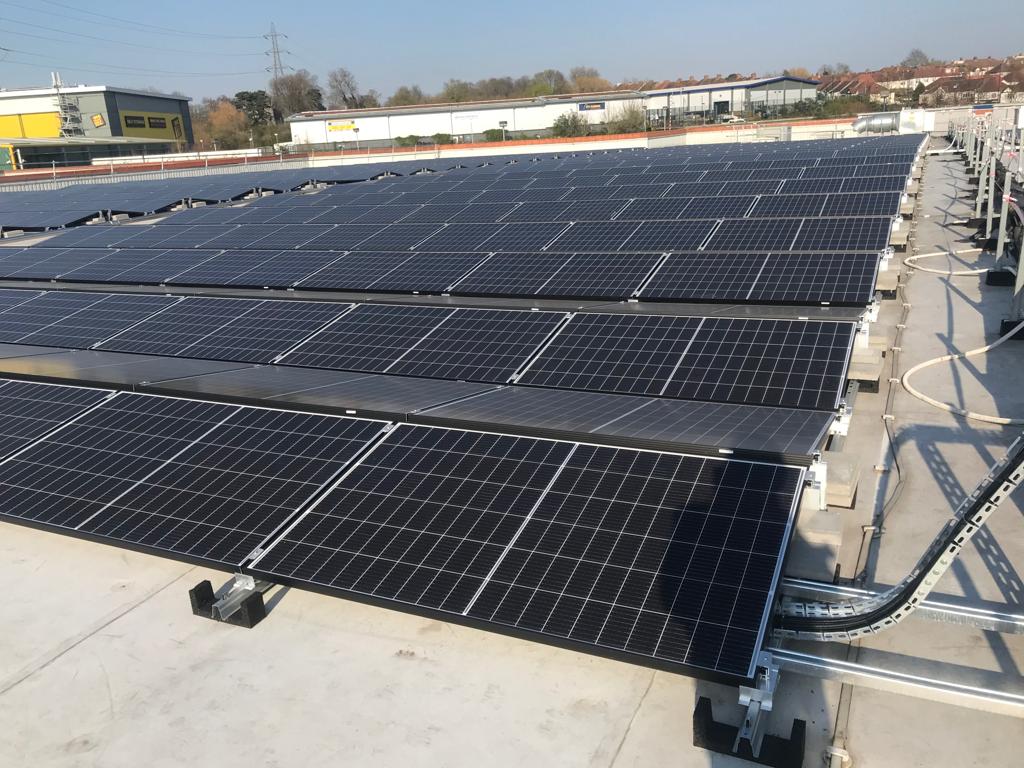
Unlocking Large-Scale Solar Funding: The Contracts for Difference (CfD) Scheme
The Contracts for Difference (CfD) scheme is the UK Government’s main tool for supporting low-carbon electricity generation. It provides long-term revenue certainty for large-scale renewable projects, making it particularly useful for commercial solar developers.
How it works: CfDs guarantee a fixed ‘strike price’ for electricity. If the market price falls below this rate, the government pays the difference. If it rises, the generator repays the extra amount, ensuring price stability for developers and fair value for consumers.
Who qualifies? Renewable energy generators in Great Britain can enter CfD auctions by submitting sealed bids. Winners secure a 15-year private contract with the Low Carbon Contracts Company (LCCC). Six auction rounds have already supported technologies like solar, wind, and biomass.
Key players:
✅ LCCC: Manages contracts and payments.
✅ National Grid ESO: Runs the auctions.
✅ Ofgem: Regulates the scheme and handles disputes.
Why it matters: For commercial landlords, developers, and investors, CfDs offer a reliable income stream that makes larger solar projects more financially feasible.
Need help navigating CfDs?
Excel Energy supports clients throughout the entire process, from checking eligibility to preparing competitive bids, ensuring your solar investment meets both policy and profitability goals.
Solar Panel Funding Options and subsidies For Solar Panels
Adopting solar energy is a significant investment, but with the right solar panel funding options and subsidies for solar panels, businesses in the UK can make this transition more affordable. By finding the various funding opportunities available, you can multiply savings and reduce the upfront costs of your solar PV Panel installation.
Breakdown Of Solar Panel subsidies and their benefits
Solar panel subsidies are designed to ease the financial burden of renewable energy adoption by offering partial coverage of installation or operational costs. For businesses, these benefits include:
Lower Initial Costs
Subsidies reduce the upfront investment needed for solar panels.
Improved ROI
With reduced expenses, businesses can achieve faster returns on their solar energy systems.
Fluid Financial Flexibility
Subsidies free up resources for other sustainability projects or business operations.
Combining solar panel subsidies with solar panel funding programs creates a powerful financial package that makes solar adoption more feasible for businesses. While grants for solar panels provide direct financial support, subsidies add ongoing cost reductions, such as operational incentives or tariff-based rewards like the Smart Export Guarantee (SEG) Renewable Energy Guarantees Of Origin (REGO). Together, these solar panel grants significantly lower your solar system’s initial and long-term costs.

How to Apply for business solar grants
Traversing the process of applying for grants for solar panels can seem complex, but with the right guidance, your business can secure the financial support needed to transition to renewable energy. Here’s a step-by-step approach to finding and applying for solar panels grants UK, along with key insights to ensure a smooth application process.
step-by-step guide to finding and applying commercial solar panel grants
Research Available Grants
Begin by researching national and local funding schemes, such as the Smart Export Guarantee (SEG) or council or Government-specific initiatives. Monitor updates from government agencies and renewable energy organisations to identify suitable options.
Assess Eligibility Criteria
Each solar panel grant program has specific requirements regarding business size, energy usage, and project scope. Ensure your business meets these criteria before applying.
Prepare a Detailed Proposal
Most grant applications require a project plan outlining your solar installation's expected impact, costs, and benefits. Include financial forecasts to demonstrate the feasibility and sustainability of your project.
Submit Your Application
Follow the UK solar grant provider's application process, ensuring all required information is included. Pay attention to deadlines to avoid missing opportunities.
Key Documents and requirements UK Solar Grants
Proof of Business Registration
Verify your legal business status.
Energy Audit or Analysis
Provide data on current energy consumption to highlight savings and benefits you can expect by going green
Installation Quotes
Include estimates from accredited solar panel providers.
Environmental Impact Assessment (if applicable)
Demonstrate how your project contributes to sustainability goals.
These documents help grant providers assess the viability and impact of the proposed commercial solar energy project.
Common Mistakes to avoid when applying for UK Solar Panel Grants
Inaccurate or Incomplete Applications
Ensure all sections are thoroughly completed, and double-check for errors before submission.
Missing Deadlines
Stay organised and track your solar panel grants application dates to avoid losing out on opportunities.
Failure to Align with Grant Objectives
Adapt your application to emphasise how your project meets the goals of the grant program, such as reducing carbon emissions or increasing renewable energy capacity.
Overlooking Local Opportunities
While national programs are well-publicised, local council initiatives can offer substantial support.
Securing solar panels grants UK can significantly reduce the cost of transitioning to renewable energy. By following this guide, preparing the necessary documents, and avoiding common pitfalls, your business can increase its chances of success and take a decisive step toward a sustainable future.
Commercial Solar Panel grants available
Investing in solar energy is a smart choice for businesses looking to cut costs and improve sustainability, but the upfront expense can be a challenge. Fortunately, the following range of commercial solar panel grants are available across the UK to help businesses easily transition to renewable energy.
These grants for solar panels and funding options are designed to reduce financial barriers, making solar power accessible for companies of all sizes.
Take the first step toward a greener, more cost-effective future by evaluating the following funding options available for your business today.
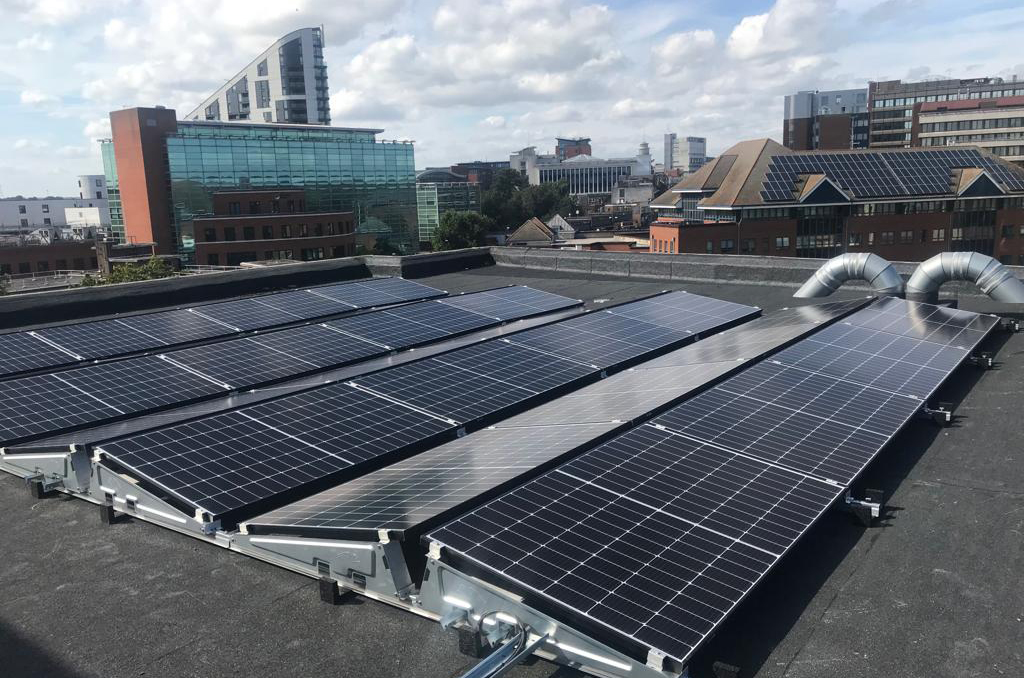
The UK government and its state owned, Great British Energy, have announced in March 2025 a groundbreaking initiative to install rooftop solar panels on approximately 200 schools and 200 NHS sites, helping to cut energy costs and reinvest savings into essential services. With a £200 million investment, this project is part of the government’s Plan for Change, aiming to improve public services and reduce reliance on fossil fuels.
Reducing Energy Bills and Supporting Public Services



This investment represents a significant step towards a cleaner, more energy-efficient future while providing long-term financial relief for schools, hospitals, and communities across the UK.
Powering Schools and NHS with solar energy £200 million fund
The INDUSTRIAL Energy Transformation Fund
The Industrial Energy Transformation Fund (IETF) is a government-backed initiative designed to support industrial sites with high energy usage as they transition towards a low-carbon future. The fund focuses on existing industrial processes, helping businesses to:


Competitive Funding Process
The IETF operates through a competitive funding process, ensuring that only the highest-quality and most revolutionary projects receive support. The fund is open to a wide range of industrial sectors, helping lead applicant sites in England, Wales, and Northern Ireland, whether part of industrial clusters or standalone facilities.
Managed by the Department for Energy Security & Net Zero (DESNZ)
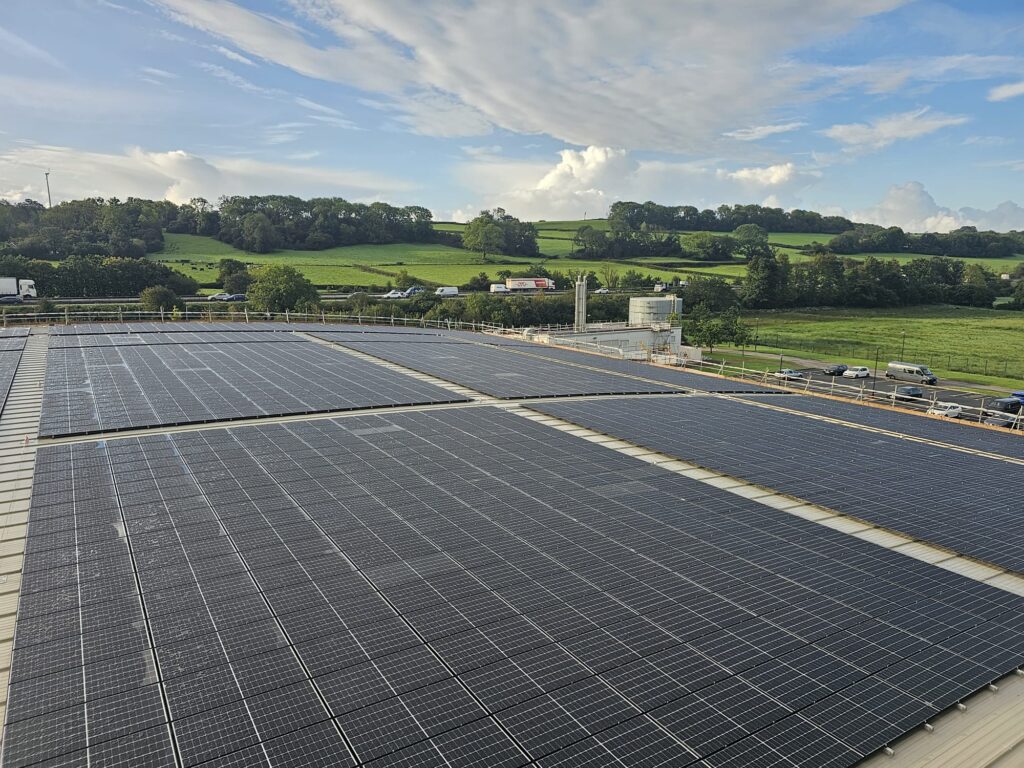
The Department for Energy Security & Net Zero (DESNZ) oversees the IETF in England, Wales, and Northern Ireland, with up to £500 million available for investment by 2028. Funding is distributed through multiple application windows, with the current guidance relating to Phase 3 of the fund, specifically the first of two application windows in Spring 2024.
The Spring 2024 competition opened for applications on Monday, 29 January, and closed on 19 April 2024. A second competition window will be available later in 2024. Phase 3 of the IETF will provide up to £185 million in funding between 2024 and 2028.
If your industrial site is looking to strengthen energy efficiency and reduce emissions, the IETF could provide the financial support you need to make a significant impact and take the next step toward a sustainable future.
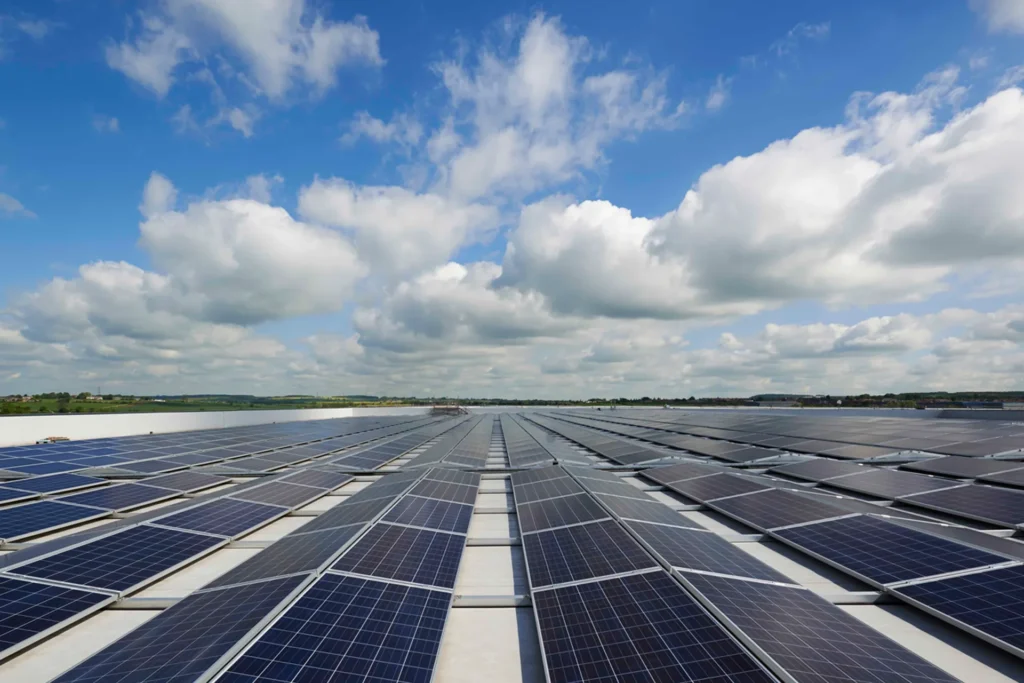
In September 2024, the Department for Energy Security and Net Zero (DESNZ) announced the launch of Phase 4 of the Public Sector Decarbonisation Scheme (PSDS), with applications opening in mid-October 2024.
This initiative is designed to assist public buildings, including schools, hospitals, and other facilities, in transitioning to cleaner heating systems and reducing carbon emissions, aligning with the UK’s net-zero targets.
About Phase 4
The PSDS provides grants to public sector organisations across England and reserved functions in devolved administrations. The scheme funds projects focused on decarbonising heating systems and implementing energy efficiency measures within public buildings.
Its primary objective is to directly reduce carbon emissions, helping organisations lower energy costs while contributing to the UK’s broader sustainability goals.
This phase underscores the government’s ongoing commitment to helping the public sector adopt clean energy solutions and reduce its environmental footprint. With a funding pool of approximately £940 million running through the 2027/2028 financial year, this phase offers substantial investment opportunities, with remaining funding awards expected to be allocated in the coming weeks to support eligible projects.
Together, we can accelerate the UK’s transition to a net-zero future!
Public Sector decarbonisation Scheme
What is the UK Shared Prosperity Fund (UKSPF)
The UK Shared Prosperity Fund (UKSPF) is a key element of the UK government’s Levelling Up agenda, designed to support communities across the UK. With £2.6 billion allocated for local investment by March 2025, grants for solar panels aim to boost prosperity in all parts of the UK, helping to address pockets of deprivation even in more affluent areas.
Key Objectives of the UKSPF:
Boost Local Pride:
Invest in local communities to build pride in place and create tangible improvements where people live and work.
Support Skills and Employment:
Focus on high-quality skills training, job creation, and productivity growth to increase life chances.
Reduce Bureaucracy:
Simplify the funding process compared to previous EU funds, allowing for more efficient use of resources with less administrative burden.
Endorse Local Decision-Making:
Equip local authorities to target investments based on the unique needs and strengths of their communities, fostering truly local decision-making.
Seizing Post-EU Opportunities:
The UKSPF seizes the opportunities provided by leaving the European Union by:
Investing in domestic priorities and targeting funding to areas that need it most.
Streamlining processes, reducing red tape, and focusing on delivering visible, local improvements.
Supporting human capital through investments in skills and employment to bolster long-term prospects for communities across the UK.
Localised Approach
Councils, mayoral authorities, and other lead local authorities across England, Scotland, and Wales will plan and deliver interventions, working closely with local partners and devolved governments. This localised approach ensures the fund is used to complement other funding sources like the Levelling Up Fund, to intensify impact and streamline delivery.
The UK Shared Prosperity Fund licenses places to thrive by making strategic investments that improve infrastructure, job opportunities, and overall quality of life, giving communities across the UK more reasons to take pride in their area.
Annual investment allowance (AIA)
If you’re installing new solar equipment for your business and intend to own the asset fully, you can benefit from a Capital Allowance.
This government-backed incentive allows you to deduct the total cost of your solar installation from your taxable profits, helping to reduce your tax bill. Specifically, through the Annual Investment Allowance (AIA), businesses can claim up to £1 million per year for qualifying plant and machinery, which includes solar panels.
The AIA is designed to encourage investment in energy-efficient technologies, such as solar power, by reducing the financial burden of such installations. By deducting the full cost of your solar equipment from your profits before tax, you can maintain financial stability while investing in large-scale solar energy projects. This can be particularly beneficial for businesses looking to reduce long-term operational costs through renewable energy while also contributing to their sustainability goals.
Moreover, by using the AIA, businesses can accelerate their return on investment, as the tax savings help offset the initial capital outlay. In essence, the AIA provides a crucial financial incentive for companies looking to transition to cleaner, greener energy sources and reduce their reliance on traditional energy systems.
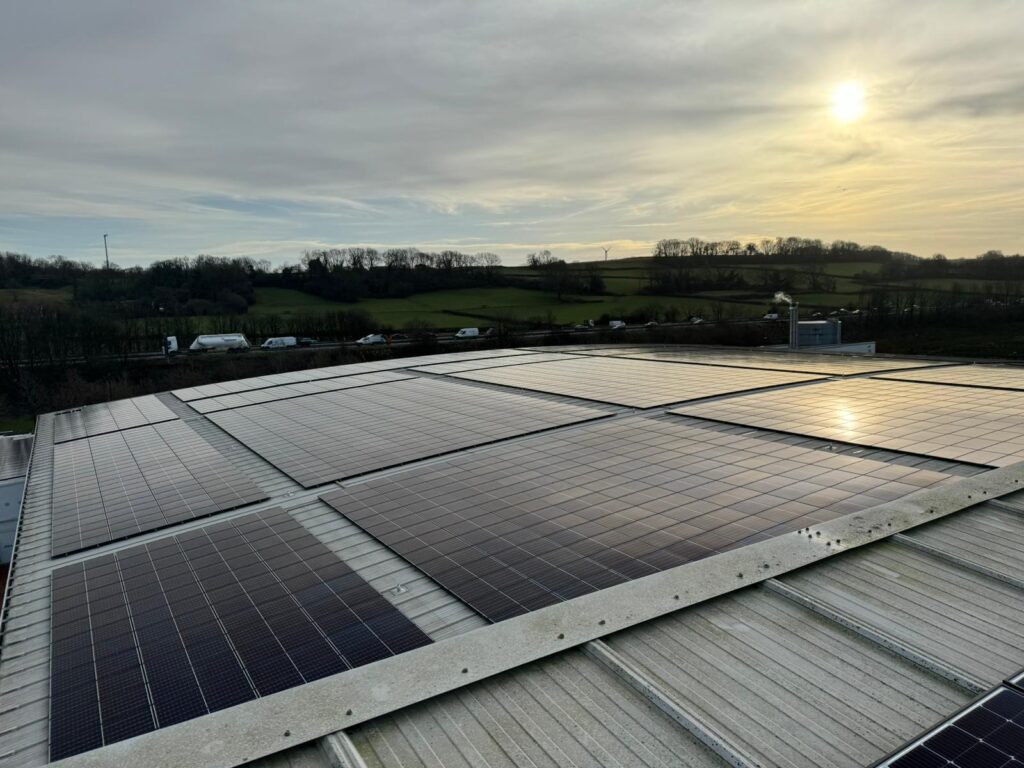
Cornwall Solar Panel Funding
Renewable Energy and Low Carbon Technology Fund
Cornwall Council’s £20 million Renewable Energy and Low Carbon Technology Fund is helping the county reach carbon neutrality by funding key projects like solar canopies at New County Hall and electric vehicle charging bays for the council’s fleet.
Alongside this, the council is driving climate action with a Local Area Energy Plan, a smart-grid wind turbine, and match funding for sustainability projects.
Community support is available through Community Energy Plus for home energy advice and Lendology CIC for renewable energy upgrades, reinforcing Cornwall’s commitment to carbon neutrality by 2030.
Cornwall and Isles of scilly Good Growth Programme
Launched in Jan 25, the UK Shared Prosperity Fund, through the Cornwall and Isles of Scilly Good Growth Programme, is also offering grants ranging from £20,000 to £200,000 to businesses with the ambition and capacity to grow.
With £184 million allocated for local investment over four years, this initiative aims to drive economic development and ingenuity.
Available to all businesses in the region, priority will be given to those in key growth sectors such as renewable energy, critical minerals, marine, and aerospace.
Additionally, projects that boost year-round employment opportunities will be strongly considered, ensuring long-term benefits for the local economy.
Somerset Solar PANEL gRANTS
Net Zero Business Grants Programme
North Somerset Council is running a Net Zero Business Grants Programme that offers grants of up to £30,000 to install renewables and energy efficiency measures.
Solar panel installations are included in this grant.
You must be a Community Interest Company or a small or medium-sized business (SME) with a registered trading address to qualify.
The UKSPF funds this Net Zero Business Grant.

Business Solar Grants Dorset
Low Carbon Dorset
Another initiative within Dorset is Low Carbon Dorset, which offers advice and grants to businesses and community groups under the Dorset council. This initiative aims to help organisations move towards renewable energy sources, cutting energy bills and carbon footprint.
The grant can cover up to 50% of your low-carbon project, which costs between £11,000 and £75,000.
This is a grant supported by the UKSPF.
SMart Export Scheme
Dorset is currently running the Smart Export Guarantee (SEG) Scheme, which buys any excess energy from your solar panels from you to distribute across the local area.
While this doesn’t help with the initial upfront costs, it does ensure that you make the money back quickly, adding to the value of the system on your property.
Berkshire, Bedfordshire and Northamptonshire
Low Carbon Workspaces
The Low Carbon Workspaces initiative is available for businesses across Berkshire, Bedfordshire, Buckinghamshire, Hertfordshire, Milton Keynes and Northamptonshire.
This initiative aims to help local SMEs transition from fossil fuel consumption and reliance on the National Grid to using renewable energy sources such as solar panels.
The scheme will cover up to a third of the investment costs, paying between £1,000 and £5,000.

Utilising solar panel grants UK, commercial solar funding and subsidies provides businesses with a powerful opportunity to reduce energy costs, improve sustainability, and invest in a greener future.
These commercial solar funding options make the transition to renewable energy more accessible, ensuring a quicker return on investment and long-term savings.
Don’t wait, apply for solar panel grants today and secure your place in the renewable energy revolution. Take action now to power your business sustainably while benefiting from the financial support available.
